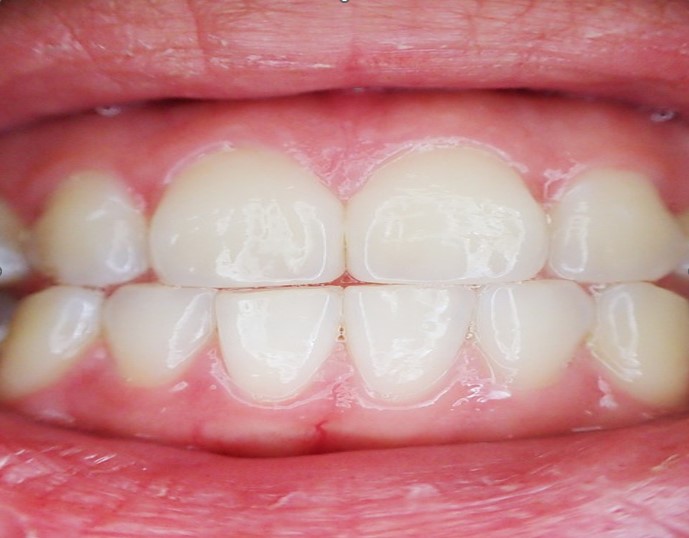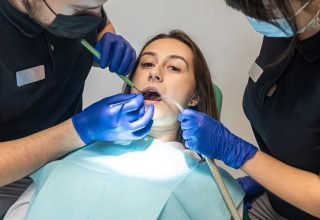Gum Recession: Causes, Prevention, Surgery & Treatment
Did you know that periodontal disease is more likely to cause tooth loss than cavities? The term periodontal disease simply refers to what you may know better as gum disease. If your daily dental hygiene habits are inconsistent or otherwise inadequate, it is important to get regular exams at your local dentist’s office so they can evaluate the health of not only your teeth but also the gums surrounding those. Lack of brushing and flossing puts your gums at risk for developing various stages of gum disease, starting with gingivitis and possibly leading to periodontitis.
One interesting fact to know about dental health is that the presence of gum disease increases the likelihood of also being diagnosed with major systemic health conditions such as diabetes or heart disease. While the association of higher risk for serious systemic disease does not necessarily indicate a correlation, it is clear that taking care of yourself includes prevention and healthy choices. On a positive note, periodontal disease is both preventable and easily treatable at early stages. Keeping up with frequent and consistent trips to visit your dentist is an important key to maintaining good overall health.
Causes
The leading cause of gum disease starts with inadequate hygiene. Poor brushing habits include inconsistency or infrequency, as well as simply not brushing long or thoroughly enough. This allows bacteria in the form of plaque to remain on teeth which can eventually become tartar if remaining for too long. Plaque can often be found along the gum line and in between teeth, and removal requires good brushing and flossing habits. When plaque is allowed to remain on the surface of teeth for long periods of time, it will likely harden. Once this happens, it has become tartar and will be more difficult to remove, therefore requiring professional help to clean teeth. Removing this sticky bacteria is vital in order to avoid the harmful toxins that can cause serious damage to gums and, eventually bone loss.
Plaque and tartar that develops on the gumline when it is not removed are what cause gingivitis, the first and mildest stage of gum disease. Being told you have this early stage of gum disease can actually be positive because gingivitis is easily treated, and further progression can be avoided! When identified early and treated appropriately, gingivitis progression can be slowed, stopped, or in some cases, and with rigorous attention, possibly reversed. Always follow professional dental recommendations to avoid the harm that would result from allowing plaque and tartar to remain on your teeth.
Prevention
It is best to avoid developing periodontal disease in the first place, and this is as easy as maintaining a healthy dental routine. Always remember to brush and floss your teeth at least twice daily for a clean mouth. Plaque that forms on your teeth throughout each day needs to be removed consistently because it will always return; there is no avoiding this. Keep returning to your local dentist on a regular basis and following recommendations made specifically for you by the dental professionals who care for your teeth. A dental practice such as R+R Dental near Plainview, New York will guide you in how often you should be seen for professional cleaning, exams, and other preventative treatments.
Treatment
Effective oral health care always includes not only frequent and thorough brushing but also daily flossing to remove any plaque or bits of food from between teeth and other hard-to-reach spots where a tooth meets the gumline. Some signs of developing periodontal disease that indicates needing to be evaluated by your dentist as soon as possible include:
- Bleeding gums while brushing or flossing
- Swollen or red gums
- Noticeably receding gum line
- Apparent deep pockets between teeth and gums
- Increased sensitivity
- Loose teeth past childhood
If you notice any of these symptoms or have already been diagnosed with periodontal disease, it is especially important that you keep up with these vital dental hygiene habits. Flossing down under the gumline is especially necessary when gum disease risk is greater than average. This is because preventing the progression of gingivitis into more serious stages of gum disease is not only possible but important to avoid future bone and tooth loss.
When periodontal disease is present, your dentist will likely recommend you be seen for professional cleanings and gumline exams more often than the typical every-six-month visit routine. Seeing the dental professionals who clean and care for your teeth for these regular visits allows for regular evaluation to be sure your routine is keeping gum disease in check and preventing progression. With improved oral care at home and regular cleanings, there is even a chance that mild gingivitis could even be reversed, and some patients will be able to go back to return for dental care visits every six months. Always take your dentist’s recommendations seriously to work towards achieving your best possible oral health.
Surgery
Sometimes gum disease becomes so severe that surgery may be necessary to prevent further bone and tooth loss. These advanced treatment procedures are reserved for the most seriously progressed periodontal disease and can include tissue and bone grafts to help protect what remains when tooth and bone loss have occurred. When this has become the case, a periodontist will thoroughly evaluate your oral health situation and recommend the surgical option which they determine will have the greatest impact on improving the overall health of your mouth. Sometimes the gumline itself will be recontoured to shape it in order to better protect teeth. Other cases which have become serious enough to cause loose teeth due to severely deep-pocketed gum and increasing bone loss may require bone grafting to protect your mouth from further damage.
Thinking about the oral damage gum disease can cause in your mouth can be stressful but does not need to be overwhelming. There are many preventative steps that can be taken to slow progression and treatment options available when gum disease becomes a problem. Contact your dentist today for a periodontal evaluation and professional cleaning.



